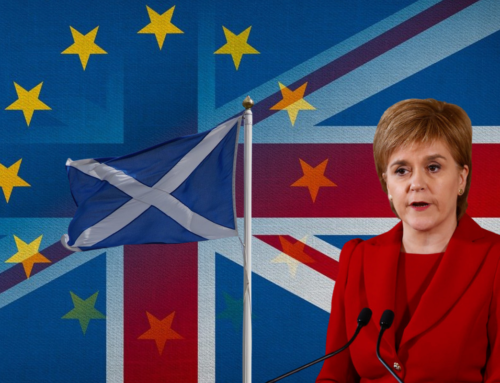by Viara Bojkova, Head of Geo-Economics Porgramme and Senior Research Fellow, Global Policy Institute
While the UK economy and the society are still adjusting to the new political and business reality, to make any final conclusions about the Brexit impact on the rest of Europe seems challenging. My intention with this piece is to make a few points to describe how the relations between Britain and the countries of Central and Eastern Europe might be affected.
First, if we look at the direct effects from the referendum outcome on these economies, they might not be large. For instance, in the case of Bulgaria, less than 3% of total exports go to Britain; there is no presence of British banks, and UK foreign direct investments have not been significant recently – €7.2 million in Q2 2015, and total UK capital outflows from Bulgaria of €30 million for the whole of 2015[1]. However, there will be some direct impact on growth. For the external shock from Brexit upon the Eurozone economy will slow down growth by 0.3 to 0.5% according to the European Central Bank. The IMF also downgraded its projection for growth in the euro area to 1.6% in 2016 and 1.4% in 2017. This contraction will be transmitted to the Eastern European economies through export channels. In the case of Bulgaria, such a contraction will lead to a reduction of GDP and possible tightening of fiscal policy, as the budget deficit is closely monitored. In addition, consumer confidence is very sensitive and consumption might well contract sharply. Similarly, deflation, which was already present in some sectors of the Bulgarian economy (-1.9% in June according to Eurostat data) may deepen and spread. Overcoming this would be a difficult task as the Japanese experience has proved.
Second, the indirect effects from Brexit will be important for the economies of Eastern Europe. The United Kingdom was a driving force behind the enlargement of the European Union to the East in the 1990s. Poland, Hungary, the Czech Republic and the rest of the Eastern members feel that they have lost a great supporter. Moreover, the UK was at the forefront of seeking to reform the union with the digital agenda and the common capital markets, which was highly beneficial for the new members, as they have established fast emerging high tech sectors. In the coming years, the European Commission will be focused on Brexit and this hypothetically will reduce the pressure for any institutional and legal reforms in the new member-countries and the associated members from the Western Balkans. To sum it up, the long-term indirect impact could be seriously damaging for Eastern Europe.
On an industry level, if we look at the case of the UK-Bulgaria entanglement, three sectors that will be hugely affected are the tech industry, the agricultural business and tourism.
- IT sector
The science and technology dimension of the British economy brings dynamism and competitiveness to the whole European economy. The tech start-ups benefit immensely from the Research and Innovation Programme Horizon 2020 of the European Union. In these complex relations, the Bulgarian tech sector has long been a subcontractor to British companies and many Bulgarian IT experts work in the UK and elsewhere in Europe, while the UK has started to invest in Bulgarian IT. An important example of the latter is the purchase by a British company, a year and a half ago of the Bulgarian insurance software developer “Fadata” (www.fadata.eu).
In addition, Bulgaria was ranked number 1 most attractive outsourcing destination in Europe in 2014, and some of the Bulgarian businesses’ clients and partners are located in the UK. Possible negative effects could be expected as a result of the worsening economic situation in the UK, and consequent contraction of markets for their clients and a decrease in the value of the British pound. There are already indications that UK companies and organisations such as the National Outsourcing Association (NOA) are looking for alternative locations.
On the more positive side, some companies in the tech sector in Bulgaria even see positive news about their business. They claim in the local newspapers that Brexit would lead to the eventual return of young talents that gained valuable knowledge, contacts and experience in the UK to strengthen the fast growing ecosystem of IT outsourcing services in Bulgaria.
2. Agriculture sector
The British agricultural sector is highly dependent on the seasonal workers from Bulgaria, Romania and Poland, which fact is not well understood in the United Kingdom. In total, about 85,000 from these countries arrive annually. This is an approximate figure given by the agencies that recruit workers from Eastern Europe on behalf of the British farms.
Although work on farms is extremely difficult, it pays between £7-9 per hour. Seasonal workers that go to the UK can be divided into two groups – one is the students who temporarily work in the UK during their summer holidays (between June and October), and the second group represents the low-skilled people, living in villages and smaller towns where unemployment is high and seasonal migration is the only alternative for accumulating sufficient income.
The seasonal workers from Bulgaria and Romania were actually one of the first targets of the UK Independence Party (UKIP) and its leader Nigel Farage in 2013-2014 as part of their political campaign. However, even then British farm representatives defended seasonal migrants and explained that their work was crucial for the survival of the British farms. In reality, the British low-skilled workers do not express any interest in doing farm work at such low wages. It has been estimated that any increase in wages to attract the local population into the agriculture sector would lead to an increase in the wholesale prices of agricultural products by 10-15%.
For this reason, the recruitment agencies in Eastern Europe do not seem to be concerned with the Brexit impact. They believe that, if a demand for low-skilled labour from Bulgaria, Romania and Poland exists, the new UK government would respect the desire of farmers and establish a new scheme. This might be similar to the arrangement that existed before the opening of the labour market in January 2014, and provided farmers with an annual quota of 21,200 vegetables and fruits harvesters. People from Bulgaria and Romania used to come for up to six months per year. Such a scheme has the potential to reduce the informal sector in agricultural employment in the UK, though it would almost certainly require a larger number of documents to be prepared and submitted to the British authorities by the Eastern European seasonal workers.
- Tourism
Bulgarian tourism is the third sector that will have to deal with the referendum consequences. The British market was the fourth largest in 2015. The official representative of Thomas Cook claims that at the moment Brexit has not affected the reservations and even recorded a growth of British tourists. However, most of these bookings were made before the referendum and any potential effects will become clearer later this year. The uncertainty in Turkey may work favourably for the Bulgarian and Romanian Black Sea resorts.
- Conclusion
In the short and medium terms the impact from the referendum will have contractionary effects on the Eastern European economies, as the direct effects will be less acute than the indirect ones. Furthermore, the small-sized members will probably have to contribute larger amounts to the EU budget, and receive less EU funds under different programmes after 2020. In the long-term, households and businesses will be concerned with the transfers from workers in the UK that return money to their own countries. In 2014, the World Bank estimated that such transfers from the UK to Bulgaria were about US $74 million that fed directly into consumption and small family investments. Some of the workers will probably move back to Spain, Italy and Greece, where they were based before the global financial crisis. Lastly, the withdrawal of the UK from the European Union will change the priorities and existing agenda of the union.
[1] Source: Bulgarian National Bank, Foreign Direct Investments in Bulgaria, 2015







